Tribal Football
·13 October 2020
The Week in Women's Football: Purfield joins Bristol City; NWSL secure two internationals: FIFA handbook review
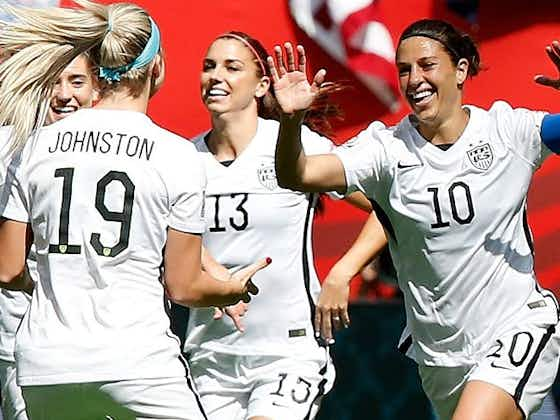
In partnership with
Yahoo sportsTribal Football
·13 October 2020

This week, we examine some more moves abroad by former UWS players, while an English international who played at two U.S. colleges signed a multi-year deal with Bristol City after leaving Liverpool following their relegation after the 2019-20 season. We also look at two internationals who have signed short-term contracts with NWSL sides and have some NWSL team updates as they finish their Fall Series of games this month. We also look at a Handbook that FIFA recently published for Women's Football Administrators at the national federations' level. We also touch briefly on eight key areas of women's football development that FIFA member football associations can apply for during the 2020-2023 period.
Former UWS Players Move Abroad/Jemma Purfield Joins Bristol City
We look at some interesting moves abroad by UWS former players (even without a 2020 season for the summer league due to COVID-19) and a former English international moves to Bristol City after two seasons with Liverpool following her career at Arizona State University and the University of South Alabama.
Goalkeeper Kelly O'Brien, formerly of the Lancaster Inferno, is joining Vilaznia of Albania, after having played with DVTK of Hungary. The Lafayette College grad spent four seasons with the Inferno of the UWS, racking up back-to-back UWS East Conference Defensive Player of the Year awards in 2018 and 2019. O'Brien allowed only seven goals in nine matches with five shutouts during the regular season.

Kelly O'Brien is leaving Lancaster for Albania. (Photo courtesy United Women's Soccer league.)
Republic of Ireland international Haley Nolan (Connecticut Fusion) signed with London City Lionesses in the FA Championship. Nolan formerly played with domestic power Peamount United in Ireland's Women's National League. She has 25 caps for the Irish-U-17 and U-19 women's national teams, and added a call-up to the senior team recently for a September camp ahead of their recent UEFA Qualification match in Germany, which the Republic of Ireland lost 3-0. She was on the bench for that match but has yet to make her debut after being with the side for 5 EURO matches in late 2019 and 2020. She played for years at the University of Hartford and in 2018 and 2019 with the UWS's Connecticut Fusion, managed by long-time U.S. soccer announcer JP Dellacamera, who is very accomplished covering the women's game and called the famous national television coverage of the 1999 U.S. Women's World Cup Final penalty kick victory over China after 120 minutes of a goalless draw in Los Angeles, an event which helped start professional women's soccer in the States. She helped the Fusion to two second-place finishes in the East Conference.
Nolan's London City side is off to a slow start to the season with 1 point (in 10th in the 11 team Championship) from a 1-1 draw to Crystal Palace, sandwiched between a 4-1 defeat to Sheffield United and 1-0 loss to Durham. In their latest match at home on October 4, they fell 1-0 to fourth place Lewes. Lewes has New Zealand international Katie Rood on their side for the third year in a row; Rood has also played at Bristol City and Juventus. London Bees (0 points) is below London City in the lone relegation spot but there are many games left in the season for the team to gain points and attempt to advance up the table. Juliette Kemppi (26), a Finnish international, is in her second season with the London City after stints at home, in Sweden with AIK, and in Norway with Kolbotn and Lillestrom. In 2018/19 she played in the FA WSL with Bristol City.
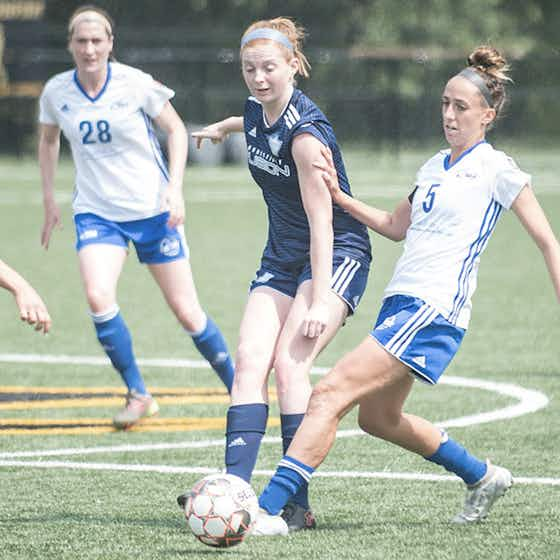
Haley Nolan in action with the Connecticut Fusion—she has signed with London City Lionesses in England's second tier. (Photo courtesy United Women's Soccer league.)
Another player with multiple international club teams on her resume, Julia Weithofer (New England Mutiny), is returning back to Lazio after a previous stint with the squad in 2018. The midfielder originally got her start with Roma Calcio Femminile, before moving to Lazio, then to Durham Women FC in England. She came back to America and in 2019 helped the Mutiny to their 2019 UWS East Conference Regular Season crown in her fifth season with the side. She played at the University of Massachusetts at Amherst.
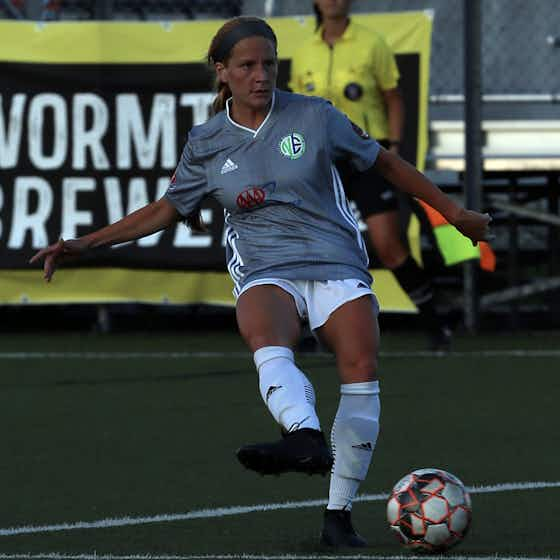
Julia Weithofer, in action with the UWS' New England Mutiny, is returning to play with Lazio in Rome. (Photo courtesy United Women's Soccer league.)
Michaela Abam (Colorado Pride) recently re-upped with Real Betis Feminine, where she's scored three goals in 15 appearances. She'll rejoin former UWS player Emily Dolan (Lancaster Inferno) on the Spanish squad. The former No. 4 pick in the NWSL Draft by Sky Blue FC, Abam also has seen time in France, netting a lone goal in ten appearances with Paris FC. Abam has two caps for the Cameroonian Women's National Team, and was named to the Women's World Cup roster last year. She previously played briefly for Sky Blue FC in 2018 in parts of 4 games (50 minutes in total). We noted last month that goalkeeper Emily Dolan (Lancaster Inferno 2014-2016) re-signed with Real Betis Feminine, while Australian international defender Jenna McCormick makes her way to Spain for the first time from Melbourne Victory (see: https://www.tribalfootball.com/articles/the-week-in-women-s-football-nwsl-returns-college-football-suspended-for-2020-uws-moves-abroad-4338896).
Abam scored a hat trick in Real Betis's first game of the 2020-21 season, as Betis overwhelmed Hispalis 10-0 on September 24 in the Andalusian Women's Cup quarterfinal. Betis then defeated Cordoba (2-1), who defeated Pozoalbense in another quarterfinal, in the semifinal and won the Cup with a 2-1 win over Granada on September 26. In the club's first friendly, another African international in the side—Equatorial Guinea's Dorine Chuigoue—made her debut in Betis' 2-0 win over Granada the weekend before the Cup started. Dorine (31), as she is known, played two seasons at Logrono and won a league crown in 2017-18 with Spartak Subotica in Serbia in the Super Liga Zene, after doing the same in a previous stint with the club in 2011-12, before returning to play at home at the club level.
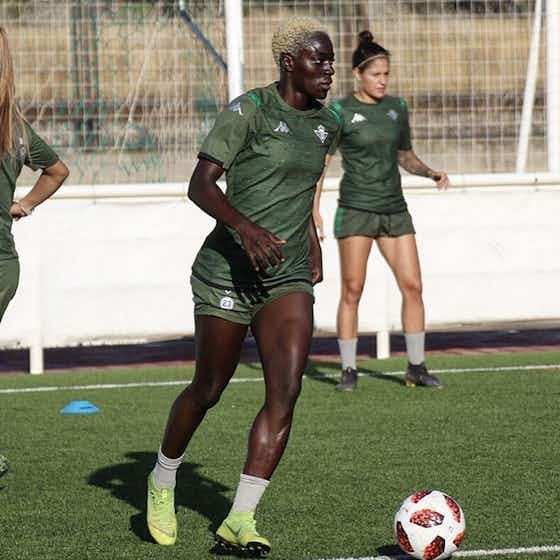
Michaela Abam in training with Real Betis of Spain. (New England Mutiny)
Real Betis' Andalusian Women's Cup tournament victory was a good start to the new season for the club who hope to finish above what has become a bit of a ritual sixth place at the end of the season. With the exception of a 12th place finish in the 2019-20 abbreviated league season because of the COVID-19 pandemic, Betis finished sixth in both the 2018-19 and 2017-18 campaigns. In Betis' season opener on October 4, the green and whites fell to promoted Eibar 1-0, with 29-year-old Brazilian import Juliana scoring the loan goal just before halftime. Juliana played last season at Tenerife. She played for her country at the 2010 U-20 Women's World Cup in Germany and for a number of clubs at home, including Iranduba, Sao Jose, and Foz Cataratas in the far west of the country, before moving to Spain, Other imports in the Eibar squad include Charity Adule (ex-BIIK of Kazakhstan and who played for Nigeria in the 2010 and 2012 FIFA U-20 Women's World Cups, the latter in which her side lost the Final to host Germany 2-0), Thembi Kgatlana of South Africa (ex-Houston Dash, Beijing BG Phoenix and Benfica of Portugal, who played at the 2016 Summer Olympics and 2019 Women's World Cup) and Honoka Yonei (21), with both Kgatlana and Yonei substituting into the match against Real Betis. Yonei has been in Eibar's academy since 2018.
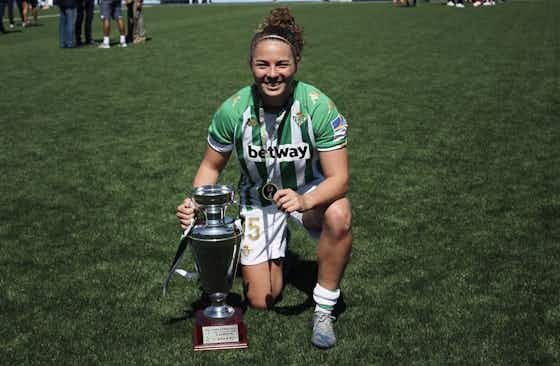
Real Betis' Australian international Jenna McCormick displays the Andalusian Cup won ahead of the start of Spain's 2020-21 Primera Division Femenina. Photo courtesy of Real Betis FC.
English native Jemma Purfield (ex-Arizona State University and University of South Alabama) signed a two-year deal with Bristol City Women's Football Club in July. In two years as a Sun Devil, the forward/defender totaled eight goals and nine assists in 37 games. She was not selected in the 2019 NWSL College Draft and signed with Liverpool for the remainder of the 2018-19 season and again for last season. After the Reds were relegated at the end of the 2019-20 abbreviated campaign, she was a free agent and signed with City. She has been an England international at the U-17, U-19 and U-23 levels. She joins first year Australian imports Chloe Logarzo and Ella Mastrantonio with Australian/English head coach Tanya Oxtoby, who was born in Australia and played exclusively there but has coached in England since 2012. Welsh international defender Gemma Evans is in her third year with the club. Belgium international Yana Daniels (28) is also in her third season at the club but interrupted that spell with a 2018-19 season at Liverpool. Benedicte Haland, a 22-year old goalkeeper and a former U-17 and U-19 international, comes from Norway's Sanviken for her first season in the English league.
Two Internationals Sign Short-Term Deals with NWSL Sides to Finish the Fall Season
England youth international Mikaela Howell signed a short-term contract with Sky Blue FC for the remainder of the NWSL Fall Series. Howell, from Basingstoke, England, excelled at Monroe Junior College and then became an assistant coach at the New York City-based institution. Howell scored 43 goals in just 26 matches at MCC. She was named National Junior College Athletic Association (NJCAA) All-American twice. Howell still holds records for most goals scored, most points earned, and most assists in a single season at Monroe. Before moving to the States, Howell was a member of the English U-15 and U-17 national teams while playing for Arsenal LFC. After being with Arsenal LFC for seven years, Howell had stints in England with Chelsea LFC, Birmingham City LFC, and Reading WFC. After moving to the United States to attend Monroe College, Howell played for D.C. United Women in the now defunct USL's W-League in 2012, scoring five goals and notching seven assists. Howell was eligible to play in Sky Blue FC's last two matches of the Fall Series, both at home against the Washington Spirit on October 3 (a 1-0 loss in which she did not appear) and versus the Chicago Red Stars on October 10. Both Sky Blue matches are being staged without fans due to COVID-19 at Montclair State University, home of New York Red Bulls II, rather than at their new home of Red Bull Stadium in Harrison, New Jersey, where the Red Bulls of Major League Soccer play.
Jamaican international Havana Solaun signed a short-term contract with the North Carolina Courage and then played against the Houston Dash on October 4. Solaun scored her country's only Women's World Cup Final Goal against Australia last summer in their last group game, a 4-1 loss in Grenoble. Solaun was drafted 15th overall in the 2015 NWSL Draft by the Seattle Reign. She suffered an injury her rookie season but played in four matches and scored one goal in 2016 before being traded to the Washington Spirit. The midfielder made 37 appearances with the Spirit during the 2017 and 2018 seasons.
In 2019, Solaun elected to play for Klepp IL in Norway as she prepared for the 2019 FIFA Women's World Cup. The midfielder earned her first cap with the Jamaican Women's National Team on March 3 just months before the start of the tournament.
Solaun debuted for the Courage on October 4 in the second half of the Courage's 4-1 loss against the summer Challenge Cup Champions Houston Dash. The Dash's Kristie Mewis had a goal and 3 assists, while Canadian international Sophie Schmidt, Veronica Latsko and Shea Groom scored singles. Lynn Williams scored a loan reply for the 2019 NWSL Champions. The NC Courage has four points in the competition for the Verizon Community Shield. The team will close out the Fall Series against Houston on Sunday October 10 and then against Orlando Pride on Saturday, October 17 on national television. In between the two league games, the Washington Spirit will face off against the North Carolina Courage in a closed-door exhibition match on Saturday, October 10 in Cary, North Carolina. The Spirit lost their only 2020 match against the Courage (2-0) in the 2020 NWSL Challenge Cup group stages this summer in Utah. The Spirit concluded play in the 2020 NWSL Fall Series on October 3 with a 1-0 win over Sky Blue FC on the road; Washington's Japanese international Kumi Yokoyama scored from a brilliant low blast from just outside the penalty area for her first NWSL goal. The Spirit finished the Fall Series with a record of 2-1-1 (7 points) and a goal differential of +1. The Spirit currently leads the Northeast Pod with one match week remaining.
FIFA Issues Women's Football Administrator Handbook—a Review
FIFA recently issued the first ever Women's Football Administrator Handbook. The 200 page document is aimed at Federation officials to guide them in the development of women's football (see: https://img.fifa.com/image/upload/nduju6vk2fyr7d8doyu3.pdf)
FIFA President Gianni Infantino stated the purpose of the document early in the book on pages 2-3 in his welcoming letter, "We strongly believe in the power of women's football, but we know that we cannot do everything on our own. We all have a duty to do the groundwork and strengthen women's football development wherever we are. It is incumbent on all of us to further professionalise the women's game. I hope that you will find practical guidance and inspiration in this handbook as you work to enhance your support for women's football, both on and off the pitch."
The Handbook further expands on FIFA's future plans for women's football on page 8,
"As part of FIFA 2.0, our overarching vision for the future of the game, we set a ten-year goal of growing participation in women's football to 60 million women and girls worldwide by 2026. In addition, with the Women's Football Strategy that we unveiled in 2018, we established a broad plan for the development and professionalisation of the women's game in five key ways:
FIFA further states that, "This handbook is a guide, offering a better understanding of how strategies, practices and procedures can reinforce the objectives of growing women's football and foster gender equality. It can be read from start to finish, but it also can be used as a reference book in which every chapter is an independent unit. While it is a tool for learning and development, it is not designed to answer every specific question or issue that might arise. Rather, it proposes good practices learned from experience and points the reader in the right direction for further and specific support." (Page 10)
The handbook, aimed primarily for the 211 FIFA Member Confederations, is sub-divided into four sections, "The first emphasizes the importance of having women in leadership positions and offers new and innovative ways to evolve and establish women's participation at all levels; the second deals with the need for a women's football strategy and how it can be implemented in your organisation; the third covers the financial support and programmes that are available to help you grow women's football professionally; and the fourth presents the benefits of hosting a FIFA tournament and how to approach the bidding process. In addition to covering gender matters in general, this handbook also brings together all gender-specific areas in FIFA's regulatory framework, ranging from the FIFA Statutes and their female quotas to player registration and the women's international match calendar (Page 13)."
There are some quite good sections within the handbook, including some enlightening facts regarding the benefits of women's football in organizations in general and some statistics for the incidence of women in leadership positions at the FIFA member associations:
The FIFA Handbook also presents some effective examples of associations around the world developing their women's football programs:
There is particular emphasis on the Women's Football Officer role in the Handbook, including a description of goals and responsibilities for the role:
The FIFA Football Administrator's Handbook also details some funding options that are available to National Football Associations, which they can draw on to support women's football development and advancement:
A strong emphasis in this tome from FIFA is that, "SUPPORT IS NOT LIMITED TO MEN'S FOOTBALL. THE INVESTMENT OPPORTUNITIES ARE JUST AS VALID FOR WOMEN'S FOOTBALL AS THEY ARE FOR MEN'S." The Handbook covers a wide range of areas such as infrastructure, competitions, capacity-building, equipment and national team support with the following objectives:
Some examples of the beneficial utilization of FIFA funds for FA's women's football programs include:
The handbook also presents information on the Regulations on the Status and Transfer of Players or RSTP. Some key elements of player contracts include:
FIFA denotes some important minimums that player contract should include:
The Handbook also goes into more detail on other topics such as:
The Handbook also included information on the Women's International Match Calendar (Pages 162-165) and Bidding to Host FIFA Women's Tournaments (Pages 168-183).
Overall, the FIFA Football Administrator's Handbook is a very attractive document and a credit to FIFA's high standards for their publications, with lots of colorful pictures, graphs and quotes from key influencers. However it is less of a detailed handbook and more of an introductory tool for member associations looking to expand their women's football efforts. At times, it also seems to be more of a selling effort to member associations as to the benefits of increasing their women's football initiatives. There is a lot of information on running programs that seems pretty basic project management business organization guidance and not really football specific. As a first step, it's a tremendous product but we would expect further editions to go into more details on certain issues, such as for setting up new programs and leagues for women. One area that they can utilize content from is the very highly rated FIFA Master - International Master in Management, Law and Humanities of Sport. The two decade old program is (according to FIFA Materials on the program), "Organised by the International Centre for Sport Studies (CIES) in partnership with three universities, De Montfort University in Leicester (England), SDA Bocconi School of Management in Milan (Italy) and the University of Neuchâtel (Switzerland), the FIFA Master in Management, Law and Humanities of Sport was created to promote management education within the sports world. It has developed to become a top graduate programme developing all-around managers who can cope with the increasingly complex world of sport. I have interviewed graduates of that program in the past and it is superb. FIFA's Football Administrator Handbook does not present content at that level of depth so the FA's will have to guide a user with supplemental materials and courses—both within sport, business, data analysis and communication.
FIFA Identifies Eight Key Areas of Women's Football Development for FA Funding Grants During the 2020-2023 Period
In other FIFA news, member football associations will be able to apply for support across eight key areas of women's football development during the 2020-2023 period. In addition to financial assistance to cover the costs in selected programmes, the FIFA Women's Development Programme will also provide federations with access to women's football experts, additional equipment and technical support within FIFA in order to develop women's football in their country. This program builds upon the solid foundations laid by the FIFA Forward Programme (see above). It also follows the recent announcement of an additional USD 500,000 grant per MA as part of the COVID-19 Relief Plan that will be specifically allocated to women's football.
The FIFA Women's Development Programme includes the following projects:
• Women's Football Strategy
• Women's Football Campaign
• League Development
• Club Licensing
• Capacity-Building for Administrators
• Coach Education Scholarships
• Coach Mentorship
• Women in Football Leadership
Fatma Samoura, FIFA's Secretary General, explained, "FIFA's commitment to supporting our member associations in developing women's football remains one of our top priorities. In addition to the funding currently available via the COVID-19 Women's Football Grant and the FIFA Forward Programme, the FIFA Women's Football Development Programme will provide more support and assistance to member associations so that they can invest in the women's game at all game at all levels."
Tim Grainey is a contributor to Tribal Football. His latest book Beyond Bend it Like Beckham on the global game of women's football. Get your copy today.
Follow Tim on Twitter: @TimGrainey


Live




Live




Live




Live




















































